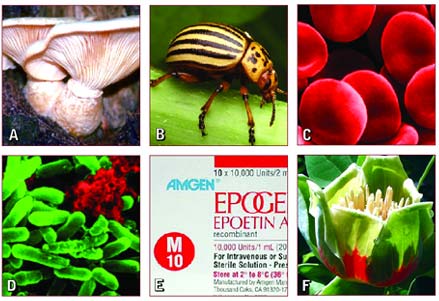


CCRC — Behind the Scenes
by Jessica Laverentz

Samples arrive
daily, often packed in dry ice. They might be bacterial polysaccharides or cobra
venom, a new vaccine or Brazilian coffee.
They come from research laboratories — university, government and private — where scientists
want to know more about the complex carbohydrates in those samples.
Complex carbohydrates occur in all living cells and may hold clues for new cancer diagnostics
and vaccines or provide new insights into molecular communication within cells.
Where are complex carbohydrates found? (see answers below)

Credits: A. Theodore D. Leninger,USDA Forest Service, www.forestryimages.org; B. Scott Bauer, USDA ARS, www.insectimages.org;
C & D. James Sullivan, www.cellsalive.com; E. Courtesy of Amgen; F. Paul Wray, Iowa State University, www.forestryimages.org
Answers:
A. In fungal cell walls: some may have medicinal properties
B. In insect exoskeletons
C. In red blood cells: cell surface carbohydrates
determine blood type
D. In bacterial cell walls or capsules: the molecules trigger immune response
E. In anti-anemia drug erythropoietin: carbohydrates
increase efficacy
F. In plant cell walls: for structure, regulation of growth
& development, stimulation of defenses
“Our structural work emphasizes the carbohydrate component of samples we receive,” said
Parastoo Azadi, who directs the three service labs of UGA’s Complex Carbohydrate Research Center.
“We provide a service not many other people can. Not many people have the sophisticated instruments
or the expertise to analyze their carbohydrates, so they come to us. As long as they have a
carbohydrate, we’ll analyze it.”
Service lab chemists analyze these hard-to-study molecules, determine their structures and
provide preliminary reports to the researchers, who then use the information to gain a better
understanding of how specific complex carbohydrates function.
“The CCRC is a unique national resource that needs to keep going,” said Gerald Hart, department
director and biological chemistry professor at Johns Hopkins University School of Medicine. “It
provides educational services and technical expertise that are not available anywhere else.”
Funded in part by federal grants, the CCRC service labs assure that researchers nationwide have
access to CCRC expertise, equipment and training courses.
Each summer the service labs offer two intense, week-long courses that include lectures
by renowned CCRC researchers and hands-on experience in the labs. Scientists from the United States
and from such countries as Belgium, Italy, Switzerland, Germany and South Africa learn to answer
questions about complex carbohydrates for themselves.
Even so, that doesn’t seem to slow the number of samples that just keep arriving.
For more information, contact Parastoo Azadi at azadi@ccrc.uga.edu or Russ Carlson at
rcarlson@ccrc.uga.edu.
For comments or for information please e-mail the editor: jbp@ovpr.uga.edu
To contact the webmaster please email: ovprweb@uga.edu
![]()